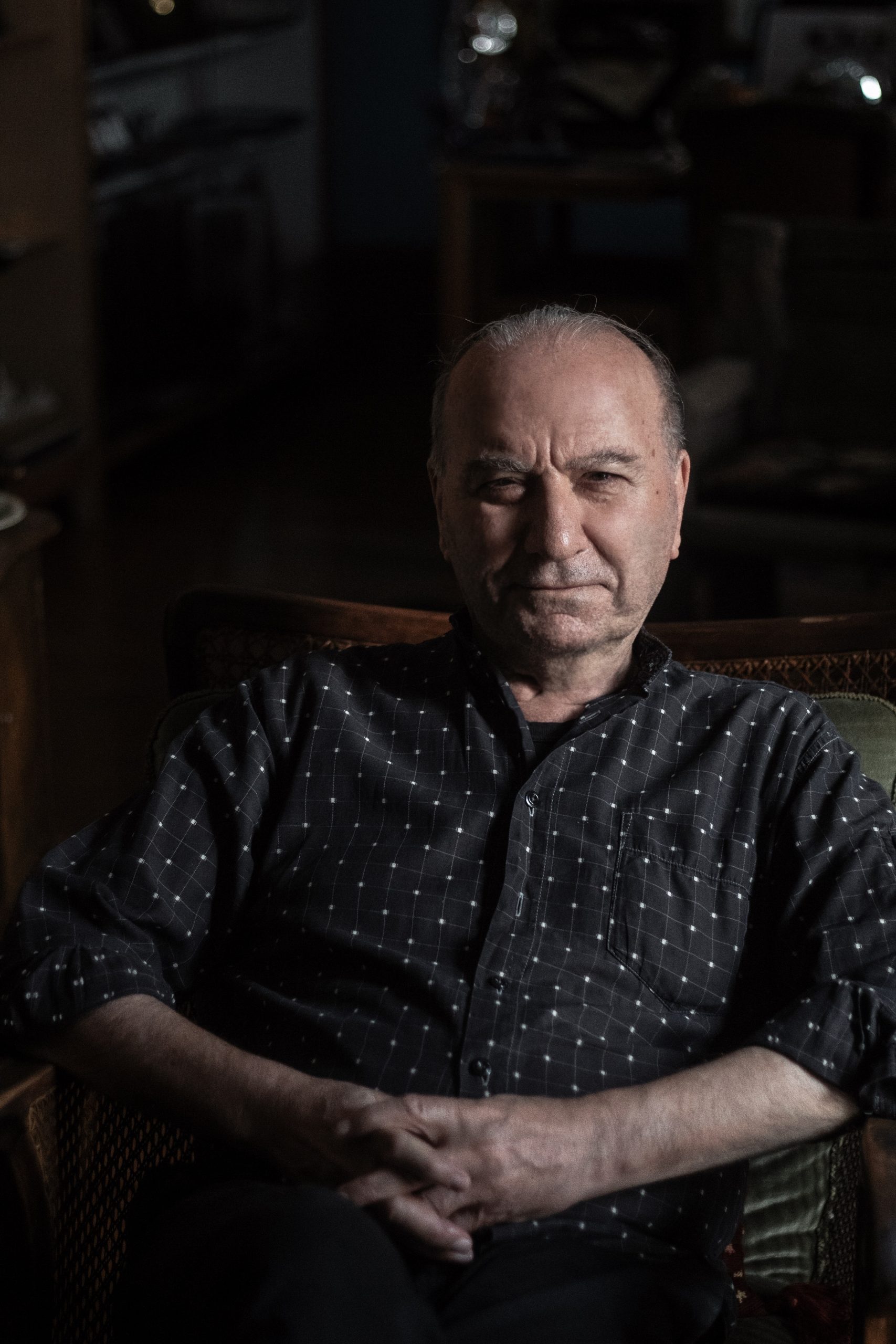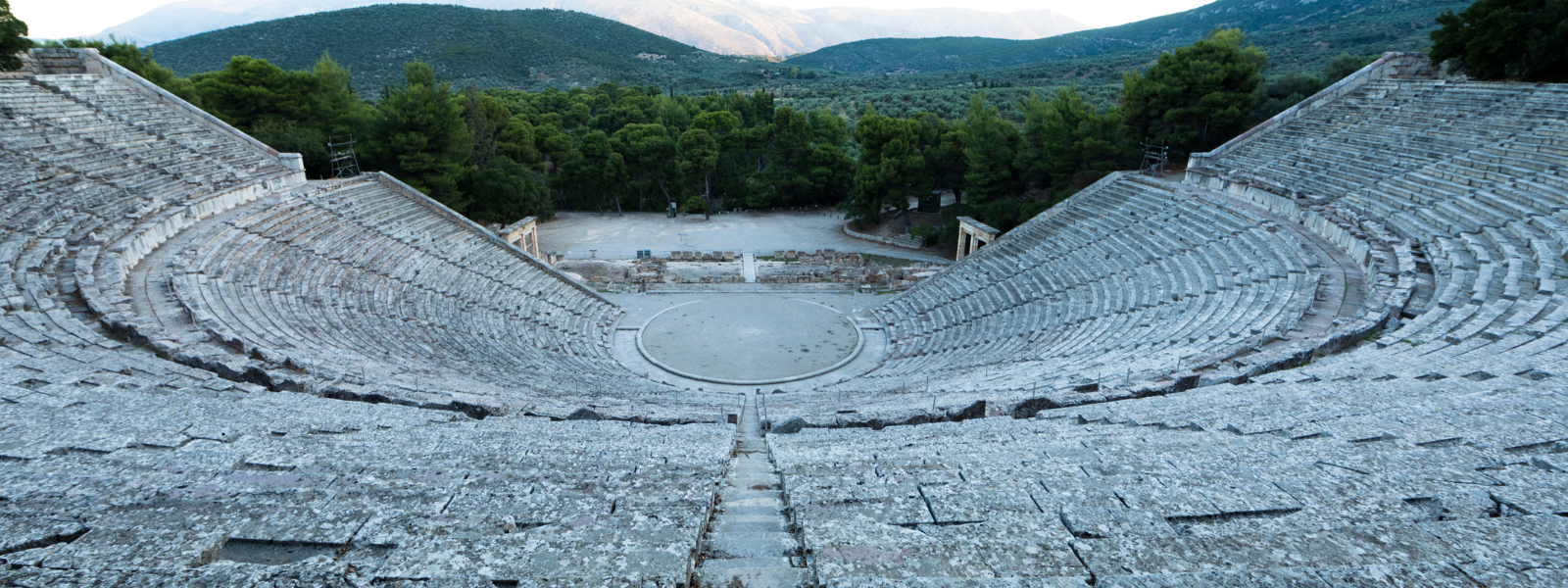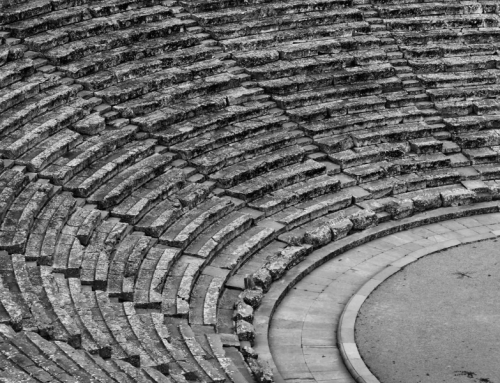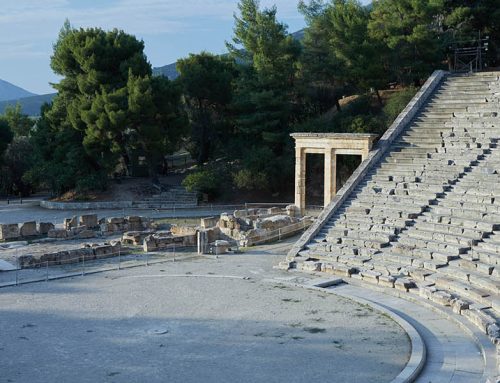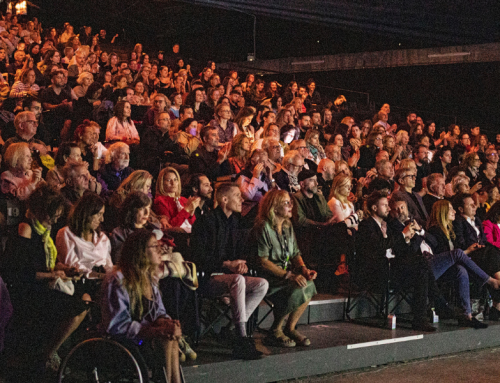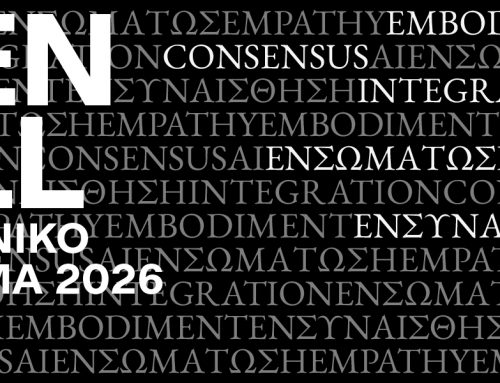From June 27th until August 23rd 2025
June 27, 28 & 29
ATHENS EPIDAURUS FESTIVAL – NATIONAL THEATRE – ULRICH RASCHE
Antigone by Sophocles
In recent years, Epidaurus has carved a distinct artistic identity through a series of world premieres, achieved either through co-productions with leading international institutions (Schaubühne, Schauspielhaus Bochum, and Residenztheater), by hosting acclaimed international theatre companies (such as the Comédie-Française under Tiago Rodrigues) or by commissioning eminent European directors to stage classic works of Ancient Drama, such as Frank Castorf’s Medea in 2023 and Timofey Kulyabin’s Iphigenia in Aulis in 2024, both of which featured Greek actors.
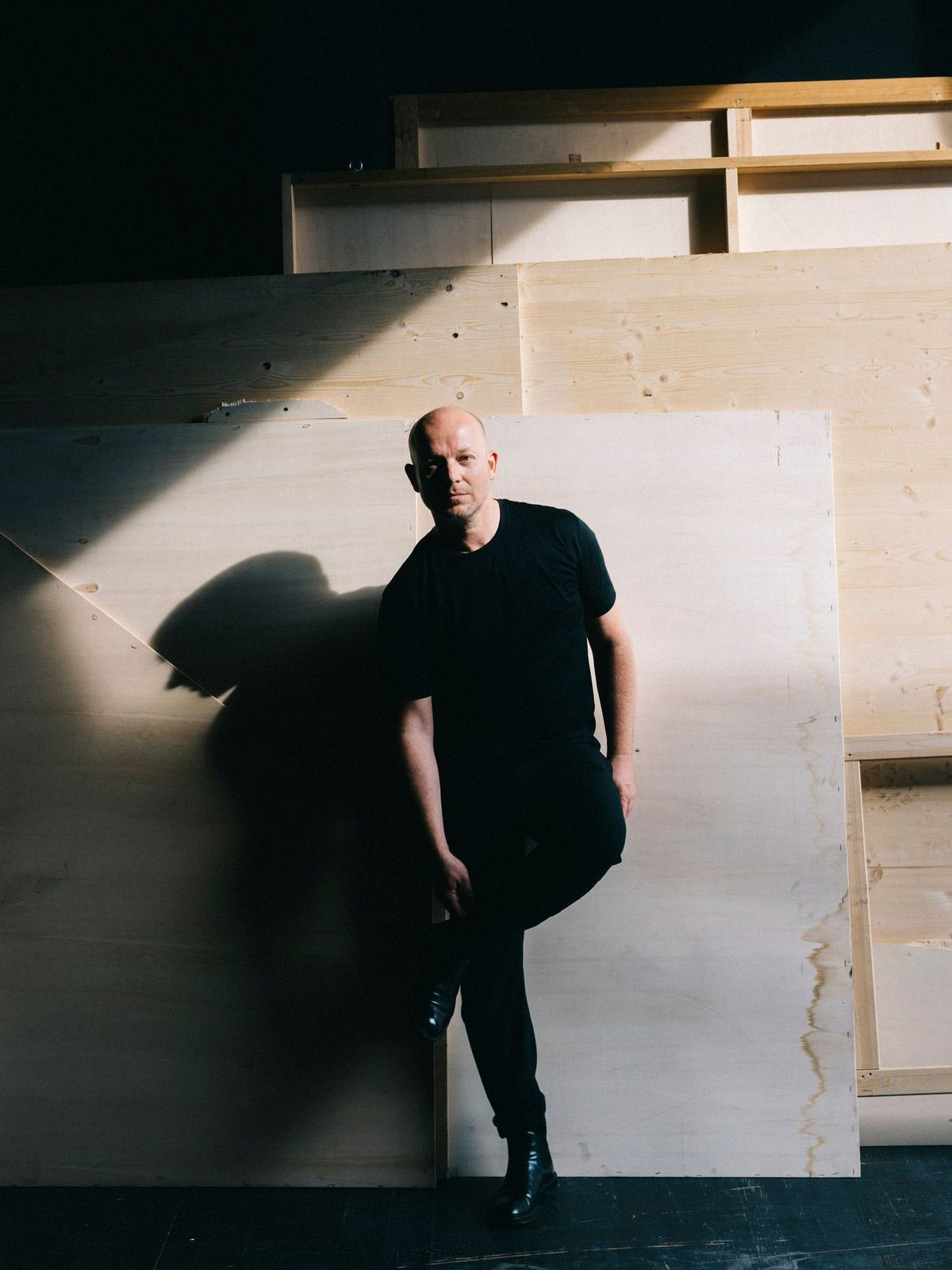
This year, Ulrich Rasche—whom we first met in 2022 with his striking approach of Agamemnon by Aeschylus in a co-production with Munich’s Residenztheater—returns to the Ancient Theatre of Epidaurus to helm direction for Sophocles’ Antigone, together with a stellar cast of Greek actors. A co-production of the Athens Epidaurus Festival and the National Theatre of Greece, the performance will be presented in Epidaurus for three nights only.
For those who witnessed Agamemnon, the ecstatic energy of the performers as they moved ceaselessly atop a vast motorised revolving stage remains indelible. Taking his radical stage language one step further, Rasche now relies on the unrivalled translation of N. Panagiotopoulos to bring to life the timeless heroine of Antigone.
The performance will inaugurate the Festival’s programme on the final weekend of June and is poised to leave the most profound artistic imprint on the anniversary year of 2025.
Direction – Set design Ulrich Rasche • Dramaturgy Antigone Akgün • Translation Nikos A. Panagiotopoulos • Music Alfred Brooks • Costume design Angelos Mentis • Lighting design Eleftheria Deko • Chorus training and guidance Yannik Stöbener • Assistant director David Moser • Set design assistant Lukas Kötz • Assistant to the director Thomais Triantafyllidou • Assistant to the set designer Evangelos Agatsas • Cast Giorgos Gallos Creon, Dimitris Kapouranis Haemon, Kora Karvouni Antigone, Filareti Komninou Tiresias, Kitty Paitazoglou Ismene, Thanos Tokakis Guard • Chorus Vassilis Boutsikos, Stratis Chatzistamatiou, Dimitris Kapouranis, Thanasis Raftopoulos, Gal Rompissa, Giannis Tsoumarakis, Giorgos Ziakas and three additional actors
Lead Donor of Epidaurus Anniversary Programme: Stavros Niarchos Foundation (SNF)
The SNF sponsorship supports the participation of the Athens Epidaurus Festival in this co-production.
July 4 & 5
POREIA THEATRE – DIMITRI TARLOW
Electra by Sophocles
What does it mean “to restore justice”? Can one live in the aftermath of violence? Is violence inevitable? Will revenge provide closure to the cycle of bloodshed? Is redemption ever truly possible? And, ultimately, what is the meaning of resistance when all seems lost?

Poreia Theatre returns to Epidaurus, this time with its Artistic Director, Dimitris Tarlow, making his directorial debut at the Argolic theatre with Sophocles’ Electra.
In a world plagued by totalitarianism and social injustice and an era where violence and revenge are often portrayed as “necessary evil,” Sophocles’ Electra takes on an eerie relevance. Far from being merely a tale of vengeance, this tragedy becomes a mirror that reflects humanity’s moral dilemmas and, foremost, the eternal conflict between justice and ethics.
Electra, a member of the accursed family of Atreides and a woman entangled in this cycle of blood and horror, is more than a tragic figure—she is someone who personifies the dilemma between the pursuit of justice and the moral imperative to forego violence. She is not just a tragic pawn of fate but a creation of her own volition, one wholeheartedly invested in the cause of justice. One then may wonder, is she a victim of her obsession with revenge or a voice of resistance against the brutality of power? And why, when the palace is freed from its tyrants, does she not step inside? Is it because she merely chooses to refrain from the House she despises so much or because she rejects the very system that she fought so vehemently against? Is she still a captive of the extreme emotions that defined her, such as the grief for her father’s loss, the hatred towards her mother, and the longing for her lost brother? One thing is certain: her passion does not quiet down, not even after the much-sought catharsis is accomplished.
In Electra, the poet does not cater to answers. Gods are away. Oracles coincide with human decisions by chance. Conscience falls by the wayside. The Furies are yet to appear. Still, the burden for all survivors is unbearable. It is this cost of choice, this relentless human need for catharsis at any price, that Sophocles’ Electra urges us to contemplate. After all, Sophocles will not grace us with a sequel, as he will not complete a trilogy, and his work shall stop here. For every single one of the doubts and questions he once posed will find their resolution within these 1,510 verses of astounding symmetry and economy.
Translation Giorgos Chimonas • Direction Dimitri Tarlow • Set & Costume design Paris Mexis • Music composition Fotis Siotas • Lighting design Alekos Anastasiou • Choreography Markella Manoliadi • Dramaturgy collaborator Eri Kyrgia • Assistant to the director Dimitra Koutsokosta, Aristi Tselou • Assistant set & costume designer TBΑ • Assistant choreographer Maro Stavrinou • Assistants to the lighting designer Charis Dallas, Nafsika Christodoulakou • Cast Giannis Anastasakis Pedagogue, Grigoria Metheniti Chrysothemis, Loukia Michalopoulou Electra, Nikolas Papagiannis Aegisthus, Ioanna Pappa Clytemnestra, Anastasis Roilos Orestes, Periklis Siountas Pylades • Chorus Margarita Alexiadi, Asimina Anastasopoulou, Ioanna Demertzidou, Ioanna Lekka, Eleni Sisti, Lydia Stefou, Anna Symeonidou, Chara Tzoka, Eleni Vlachou • On-stage musicians Fotis Siotas, Tasos Misirlis
July 11 & 12
National Theatre of Northern Greece – Cyprus Theatre Organisation – Michail Marmarinos
ζ – η – θ The stranger
A return to the sources: a visit to three Odyssey rhapsodies
In the afterglow of two performances that were destined to linger in memory, NEKYIA—presented with the Japanese theatre troupe NOH in 2015—and Sophocles’ Trackers in 2021, Michail Marmarinos revisits the Ancient Theatre of Epidaurus with yet another riveting dramaturgical proposal. Ηere, he orchestrates a return to the sources through a journey to three rhapsodies of the Homeric epic, confirming once more that the endless mystery of oral Storytelling (the cavernous mystery of Theatre itself) can still thrillingly propel us “to where history still happens”.

“Alcinous, majesty, shining among your island people,
what a fine thing it is to listen to such a bard
as we have here—the man sings like a god.
The crown of life, I’d say. There’s nothing better
than when deep joy holds sway throughout the realm
and banqueters up and down the palace sit in ranks,
enthralled to hear the bard, and before them all, the tables
heaped with bread and meats, and drawing wine from a mixing bowl
the steward makes his rounds and keeps the winecups flowing.
This, to my mind, is the best that life can offer.
(Rhapsody ι’ 2-11, translated by Robert Fagles)
* The additional excerpts of Iliad used in the performance’s dramaturgy are translated by D.N. Maronitis, Agra Publications, 2012.
Translation Dimitris Maronitis • Direction Michail Marmarinos • Dramaturgy Eleni Moleski, Michail Marmarinos • Set design Yorgos Sapountzis • Costume design Eleftheria Arapoglou • Music Andys Skordis • Choreography Gloria Dorliguzzo • Lighting design Eleftheria Deko • Mask maker Martha Foka • First assistant to the director Eleni Moleski • Second assistant to the director Alexia Paramytha
July 19
Utopia—Teodor Currentzis
Regula Mühlemann – Eve-Maud Hubeaux
Gustav Mahler: Symphony No. 4 and Songs on the Death of Children (Kindertotenlieder)
Each concert announcement by Teodor Currentzis stirs high expectations and waves of anticipation as the charismatic conductor’s performances guarantee profound artistic experiences for the audiences of music lovers worldwide. All the more so when Currentzis’ profuse musical personality engages with the grandeur of the Mahlerian oeuvre—music that challenges the listener’s intellectual and emotional cosmos through its existential excursions and metaphysical agonies.

In a unique concert at the Ancient Theatre of Epidaurus, the multi-awarded Greek conductor will lead Utopia, the independent orchestra he founded in 2022, in Mahler’s Symphony No. 4, the Austrian composer’s most celebrated work. Remarkable Swiss soprano Regula Mühlemann, one of the finest talents of her generation, will perform the fourth movement’s song.
The second part of the evening will feature mezzo-soprano Eve-Maud Hubeaux performing the heart-wrenching song cycle Songs on the Death of Children (Kindertotenlieder), which Mahler composed between 1901 and 1904 in the form of an orchestral lieder based on five poems by Friedrich Rückert.
Lead Donor of Epidaurus Anniversary Programme: Stavros Niarchos Foundation (SNF)
July 25 & 26
Athens Epidaurus Festival – Lykofos – Yannis Houvardas
Oedipus Tyrannus at Colonus
Celebrating fifty years of unwavering theatrical presence, Yannis Houvardas translates, adapts, and directs Sophocles’ Oedipus Rex and Oedipus at Colonus into a unified work on stage.
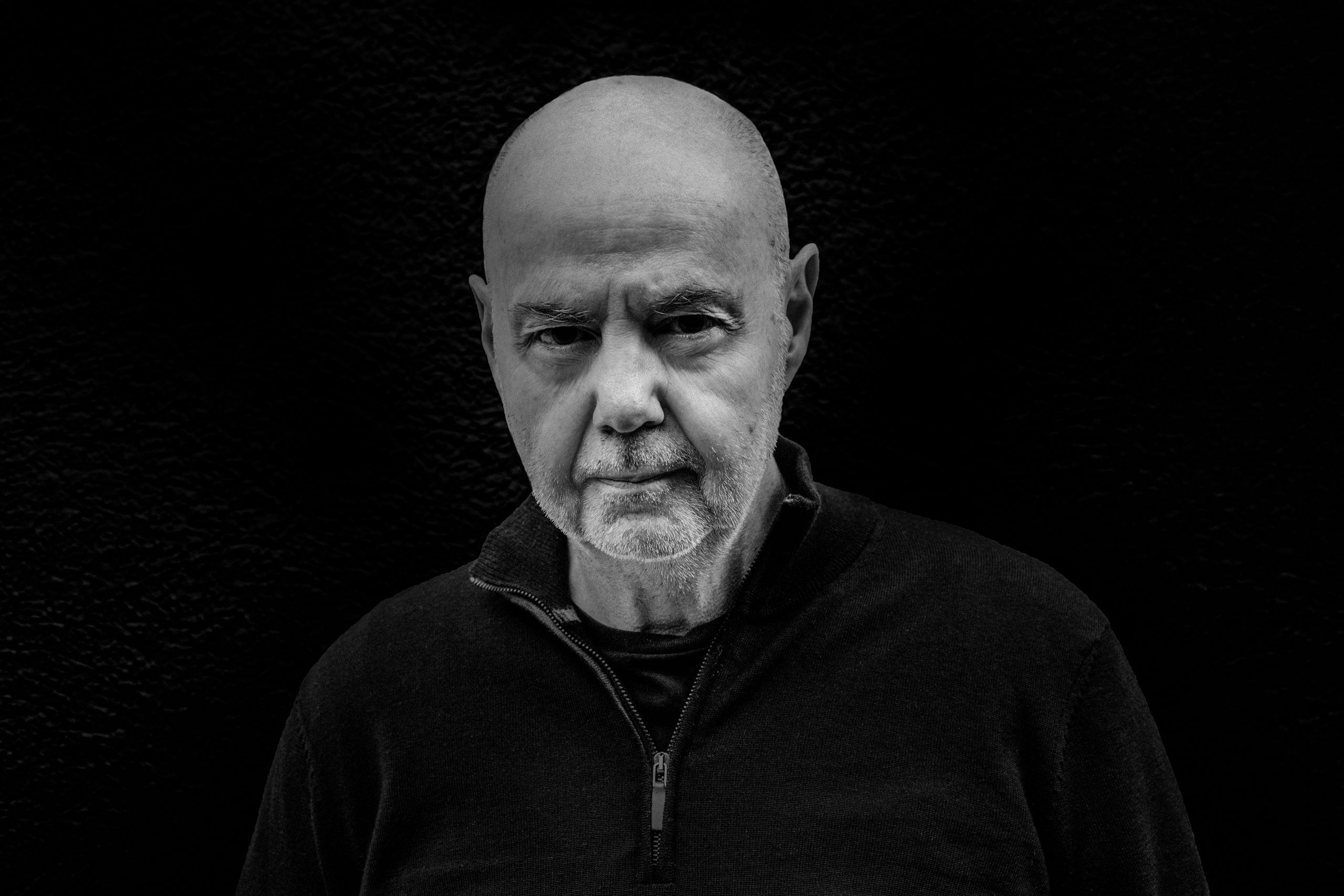
Under the guidance of the seasoned Greek director, an ensemble of distinguished actors and contributors will recount, with the accompaniment of live music, the shattering story of Oedipus, starting from the end and moving backwards to the birth of his tragic fate.
Now blind and in the twilight of his years, Oedipus, together with his close relatives, arrives at ancient Colonus—a place of mystery scattered with sacred burial monuments. There, through divine intervention, they will access the sacred secrets and finally learn the reasons they have undergone such tormented lives. In the course of this transition, the characters, alongside Oedipus, relive the devastating events of “Rex” and witness the hero’s final elevation and ascension to the heavens, as they once again pass through the stages of approaching the divine spirit detailed in Oedipus at Colonus.
Houvardas’ vision is to present these two works—profoundly different in conception and tone while written decades apart—as a single and seamless narrative. His approach honours the essence of Sophocles, the greatest of the tragic poets, while ensuring that each play remains distinctly recognisable within the performance.
Translation – Adaptation – Direction Yannis Houvardas • Set design Eva Manidaki • Costume design Ioanna Tsami • Music Angelos Triantafyllou • Movement Ermira Goro • Lighting design Nikos Vlasopoulos • First assistant director Despina Lardi • Assistants to the director Iliana Kaladami, Nafsika Kirki • Cast Konstantinos Bibis, Orestis Chalkias, Nikos Chatzopoulos, Stefania Goulioti, Karyofyllia Karabeti, Nikos Karathanos, Penelope Tsilika • Chorus Giannis Kotsifas, Ektoras Lygizos (leaders), Polyxeni Papakonstantinou, Theovi Styllou, Angelos Triantafyllou
Lead Donor of Epidaurus Anniversary Programme: Stavros Niarchos Foundation (SNF)
August 1 & 2 / WORLD PREMIERE – CO-PRODUCTION
Athens Epidaurus Festival – Théâtre national de la Colline – Wajdi Mouawad
Europa’s pledge
Lebanese-Canadian author, director, and actor Wajdi Mouawad—Artistic Director of Théâtre National de la Colline in recent years—became known to the Greek audience primarily for his screenplay in the Oscar-nominated foreign-language film Incendies (directed by Dennis Villeneuve in 2010) based on his titular theatrical play.

This ominous travelogue of Lebanon, which unfolds through a traumatic family story amid a country caught up in the maelstrom of civil war, claims a profound affinity with ancient tragedy, Mouawad’s principal source of inspiration: the schism at the heart of family, the struggle between genders, uprooting, the dire reality bequeathed from the previous generation to the next, and the search for catharsis are themes that resurface in his plays, many of which are directly informed by Ancient Drama heroes/heroines.
Politically charged and in direct dialogue with contemporary history, Mouawad’s theatrical work touches upon Myth in the same breath, seeking to illuminate the archetypal dimensions of the human condition regardless of place and time. At the same time, it delves into the search for identity beyond racial, religious, and familial boundaries, while his bold lyrical language lends the characters a distinctly contemporary sensibility, as we witnessed in his most recent play, Birds of a kind, presented last year at the National Theatre.
Mouawad first appeared at the Odeon of Herodes Atticus in 2011 with the international co-production Des Femmes, a modular adaptation of Sophocles’ Antigone, Electra, and Women of Trachis that featured a French-Canadian troupe./h3>
Among the most compelling dramaturgs currently worldwide, he revisits the Festival this year—this time as a newcomer to Epidaurus—with a new work inspired by Ancient Drama heroines. Commissioned as part of the Contemporary Ancients cycle, the performance will be presented on the first weekend of August by a multinational cast in a multilingual performance—an international co-production destined to become a summer highlight.
Text–Direction Wajdi Mouawad
Lead Donor of Epidaurus Anniversary Programme: Stavros Niarchos Foundation (SNF)
August 8 & 9
Maria Protopappa
Andromache By Euripides
We are transported far from the great city-states, deep into the Greek countryside: to Thessaly, Phthiotis, and, finally, Thetideion. To the house of Neoptolemus, Achilles’ son.

The fierce, ruthless, and irreverent hero of the Iliad, the one who cemented the victory of Greeks at Troy, now proves incapable of fulfilling his roles as a father, husband, and leader. He flees in search of a cure at Apollo’s oracle in Delphi.
His war-fuelled frenzy has tainted his marital bed, his house, and his city. Before the eyes of the woman he irreparably wronged, he will receive the retribution known as “the punishment of Neoptolemus.”
The country, the province, now decimated, is represented by a grotesque Chorus of women, abandoned, fearful, resigned, and bewildered.
In an inversion of the heroic Iliad, Euripides in Andromache lays bare the arrogance of the Greeks and the illusion of their cultural superiority. The pre-war promises for a united and mighty nation are dispelled amid a landscape ripe with decay, ageing, fear, and envy.
The burden of responsibility falls not only on the architects of destruction but also on those who placed their beliefs in them and played a part in the collapse of values through their complacency. It is the next generation that must pay the price.
Translation G. V. Tsokopoulos • Direction – Adaptation – Dramaturgy Maria Protopappa • Dramaturgy collaborator Elena Triantafyllopoulou • Artistic collaborator Eleni Spetsioti • Set & costume design Eva Nathena • Music composition Lolek • Lighting design Sakis Birbilis • Movement Alexandros Vardaxoglou • Vocal coaching Anna Pangalou • Assistant to the director Evi Nakou • Cast Giannis Dalianis, Giorgos Fasoulas, Dimitris Georgiadis, Stella Gika, Tasos Lekkas, Dimitris Mamios, Dimitris Piatas, Maria Protopappa, Argyris Xafis, and five additional actors • Executive producer Kart Productions • Production Tehnihoros
August 22 & 23
National Theatre – Theodoros Terzopoulos
Oresteia By Aeschylus
Aeschylus’ iconic trilogy, Oresteia, directed by Theodoros Terzopoulos—in the first collaboration of the internationally celebrated director and teacher with the National Theatre—stands as one of the most remarkable instances in the recent history of Greek theatre.
